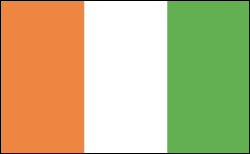- / Countries of the World
- / news and current events
Côte d'Ivoire News & Current Events

Index
- Côte d'Ivoire Profile
- History
- News and Current Events
Power-Sharing Agreement Brings Hope for an End to the Civil War
Another peace accord between the government and the rebels was signed in March 2007. The two sides agreed to set up a power-sharing government and establish a joint army. Observers were cautiously optimistic that this deal would finally end the civil war. In April, rebel leader Guillaume Soro—President Gbagbo's bitter rival—was sworn in as prime minister, and a new government was formed.
Gbagbo Refuses to Accept Election Results
After several postponements by President Gbagbo, Côte d'Ivoire held its first presidential election in ten years in Oct. 2010. The first round of voting between incumbent Gbagbo and his historic rival Alassane Ouattara, a former IMF official who was excluded from the presidential 2000 race because he was not a pure-blooded Ivoirian, was inconclusive. In the second round, Ouattara defeated Gbagbo 54.1% to 45.9%. Gbagbo, however, refused to accept the results or step down, leaving the country on the brink of civil war. The African Union, UN, Economic Community of West African States (ECOWAS), U.S., and the EU all endorsed the results. ECOWAS officials have tried in vain to negotiate a solution to the impasse.
For several months following the November election, Gbagbo's security forces attacked and killed citizens in Abidjan and other areas. Ouattara took refuge in a hotel near the presidential palace under the protection of UN troops, and was not able to assume a leadership position. Militias from the north loyal to Ouattara, however, began battling Gbagbo's forces, bringing the country to the brink of a civil war. The violence against citizens by Gbagbo's forces peaked in March 2011, prompting Human Rights Watch to say the attacks amounted to crimes against humanity. Ouattara's militias persisted, and by April had taken control of much of the country. As the stalemate continued and civilian deaths mounted, France and the UN intervened militarily. Troops blockaded the presidential palace, and Gbagbo, who had been holed up in the basement of the presidential palace, stubbornly refused to surrender for a week before finally being apprehended. He was turned over to the International Criminal Court at The Hague in Nov. 2011, where he will face charges of crimes against humanity.
Gbagbo hails from the south of the country and supports the concept of ivoirité, which means “pure Ivoirian pride.” Ouattara is from the Muslim north, which has been at odds with the government-controlled south since the 2002 civil war began.
In Nov. 2012, President Alassane Ouattara dissolved the government of Prime Minister Jeannot Kouadio-Ahoussou and Foreign Minister Daniel Kablan Duncan was named the new prime minister. In the new cabinet, Duncan will also act as finance minister, while Charles Koffi Diby became foreign minister; Ouattara remained as defense minister, and Hamed Bakayoko interior minister.
See also Encyclopedia: Côte d'Ivoire .
U.S. State Dept. Country Notes: Cote d'Ivoire
